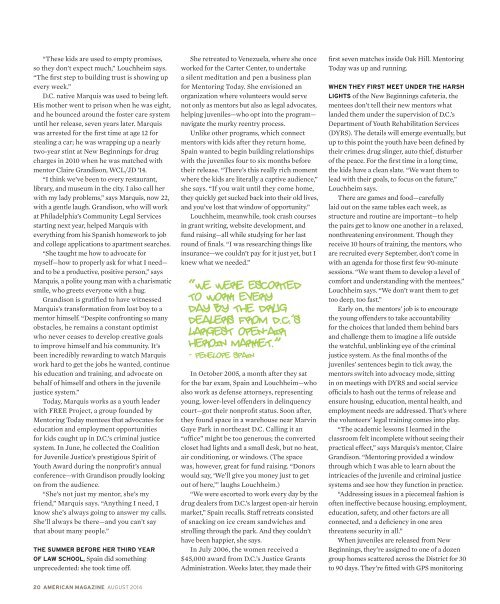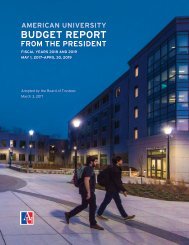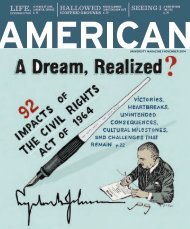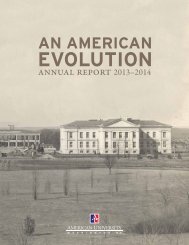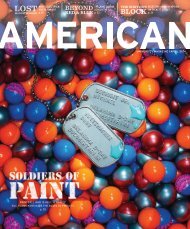American Magazine: August 2014
You also want an ePaper? Increase the reach of your titles
YUMPU automatically turns print PDFs into web optimized ePapers that Google loves.
“These kids are used to empty promises,<br />
so they don’t expect much,” Louchheim says.<br />
“The first step to building trust is showing up<br />
every week.”<br />
D.C. native Marquis was used to being left.<br />
His mother went to prison when he was eight,<br />
and he bounced around the foster care system<br />
until her release, seven years later. Marquis<br />
was arrested for the first time at age 12 for<br />
stealing a car; he was wrapping up a nearly<br />
two-year stint at New Beginnings for drug<br />
charges in 2010 when he was matched with<br />
mentor Claire Grandison, WCL/JD ’14.<br />
“I think we’ve been to every restaurant,<br />
library, and museum in the city. I also call her<br />
with my lady problems,” says Marquis, now 22,<br />
with a gentle laugh. Grandison, who will work<br />
at Philadelphia’s Community Legal Services<br />
starting next year, helped Marquis with<br />
everything from his Spanish homework to job<br />
and college applications to apartment searches.<br />
“She taught me how to advocate for<br />
myself—how to properly ask for what I need—<br />
and to be a productive, positive person,” says<br />
Marquis, a polite young man with a charismatic<br />
smile, who greets everyone with a hug.<br />
Grandison is gratified to have witnessed<br />
Marquis’s transformation from lost boy to a<br />
mentor himself. “Despite confronting so many<br />
obstacles, he remains a constant optimist<br />
who never ceases to develop creative goals<br />
to improve himself and his community. It’s<br />
been incredibly rewarding to watch Marquis<br />
work hard to get the jobs he wanted, continue<br />
his education and training, and advocate on<br />
behalf of himself and others in the juvenile<br />
justice system.”<br />
Today, Marquis works as a youth leader<br />
with FREE Project, a group founded by<br />
Mentoring Today mentees that advocates for<br />
education and employment opportunities<br />
for kids caught up in D.C.’s criminal justice<br />
system. In June, he collected the Coalition<br />
for Juvenile Justice’s prestigious Spirit of<br />
Youth Award during the nonprofit’s annual<br />
conference—with Grandison proudly looking<br />
on from the audience.<br />
“She’s not just my mentor, she’s my<br />
friend,” Marquis says. “Anything I need, I<br />
know she’s always going to answer my calls.<br />
She’ll always be there—and you can’t say<br />
that about many people.”<br />
THE SUMMER BEFORE HER THIRD YEAR<br />
OF LAW SCHOOL, Spain did something<br />
unprecedented: she took time off.<br />
She retreated to Venezuela, where she once<br />
worked for the Carter Center, to undertake<br />
a silent meditation and pen a business plan<br />
for Mentoring Today. She envisioned an<br />
organization where volunteers would serve<br />
not only as mentors but also as legal advocates,<br />
helping juveniles—who opt into the program—<br />
navigate the murky reentry process.<br />
Unlike other programs, which connect<br />
mentors with kids after they return home,<br />
Spain wanted to begin building relationships<br />
with the juveniles four to six months before<br />
their release. “There’s this really rich moment<br />
where the kids are literally a captive audience,”<br />
she says. “If you wait until they come home,<br />
they quickly get sucked back into their old lives,<br />
and you’ve lost that window of opportunity.”<br />
Louchheim, meanwhile, took crash courses<br />
in grant writing, website development, and<br />
fund raising—all while studying for her last<br />
round of finals. “I was researching things like<br />
insurance—we couldn’t pay for it just yet, but I<br />
knew what we needed.”<br />
“WE WERE ESCORTED<br />
TO WORK EVERY<br />
DAY BY THE DRUG<br />
DEALERS FROM D.C. , S<br />
LARGEST OPEN-AIR<br />
HEROIN MARKET.”<br />
- PENELOPE SPAIN<br />
In October 2005, a month after they sat<br />
for the bar exam, Spain and Louchheim—who<br />
also work as defense attorneys, representing<br />
young, lower-level offenders in delinquency<br />
court—got their nonprofit status. Soon after,<br />
they found space in a warehouse near Marvin<br />
Gaye Park in northeast D.C. Calling it an<br />
“office” might be too generous; the converted<br />
closet had lights and a small desk, but no heat,<br />
air conditioning, or windows. (The space<br />
was, however, great for fund raising. “Donors<br />
would say, ‘We’ll give you money just to get<br />
out of here,’” laughs Louchheim.)<br />
“We were escorted to work every day by the<br />
drug dealers from D.C.’s largest open-air heroin<br />
market,” Spain recalls. Staff retreats consisted<br />
of snacking on ice cream sandwiches and<br />
strolling through the park. And they couldn’t<br />
have been happier, she says.<br />
In July 2006, the women received a<br />
$45,000 award from D.C.’s Justice Grants<br />
Administration. Weeks later, they made their<br />
first seven matches inside Oak Hill. Mentoring<br />
Today was up and running.<br />
WHEN THEY FIRST MEET UNDER THE HARSH<br />
LIGHTS of the New Beginnings cafeteria, the<br />
mentees don’t tell their new mentors what<br />
landed them under the supervision of D.C.’s<br />
Department of Youth Rehabilitation Services<br />
(DYRS). The details will emerge eventually, but<br />
up to this point the youth have been defined by<br />
their crimes: drug slinger, auto thief, disturber<br />
of the peace. For the first time in a long time,<br />
the kids have a clean slate. “We want them to<br />
lead with their goals, to focus on the future,”<br />
Louchheim says.<br />
There are games and food—carefully<br />
laid out on the same tables each week, as<br />
structure and routine are important—to help<br />
the pairs get to know one another in a relaxed,<br />
nonthreatening environment. Though they<br />
receive 10 hours of training, the mentors, who<br />
are recruited every September, don’t come in<br />
with an agenda for those first few 90-minute<br />
sessions. “We want them to develop a level of<br />
comfort and understanding with the mentees,”<br />
Louchheim says. “We don’t want them to get<br />
too deep, too fast.”<br />
Early on, the mentors’ job is to encourage<br />
the young offenders to take accountability<br />
for the choices that landed them behind bars<br />
and challenge them to imagine a life outside<br />
the watchful, unblinking eye of the criminal<br />
justice system. As the final months of the<br />
juveniles’ sentences begin to tick away, the<br />
mentors switch into advocacy mode, sitting<br />
in on meetings with DYRS and social service<br />
officials to hash out the terms of release and<br />
ensure housing, education, mental health, and<br />
employment needs are addressed. That’s where<br />
the volunteers’ legal training comes into play.<br />
“The academic lessons I learned in the<br />
classroom felt incomplete without seeing their<br />
practical effect,” says Marquis’s mentor, Claire<br />
Grandison. “Mentoring provided a window<br />
through which I was able to learn about the<br />
intricacies of the juvenile and criminal justice<br />
systems and see how they function in practice.<br />
“Addressing issues in a piecemeal fashion is<br />
often ineffective because housing, employment,<br />
education, safety, and other factors are all<br />
connected, and a deficiency in one area<br />
threatens security in all.”<br />
When juveniles are released from New<br />
Beginnings, they’re assigned to one of a dozen<br />
group homes scattered across the District for 30<br />
to 90 days. They’re fitted with GPS monitoring<br />
20 AMERICAN MAGAZINE AUGUST <strong>2014</strong>


